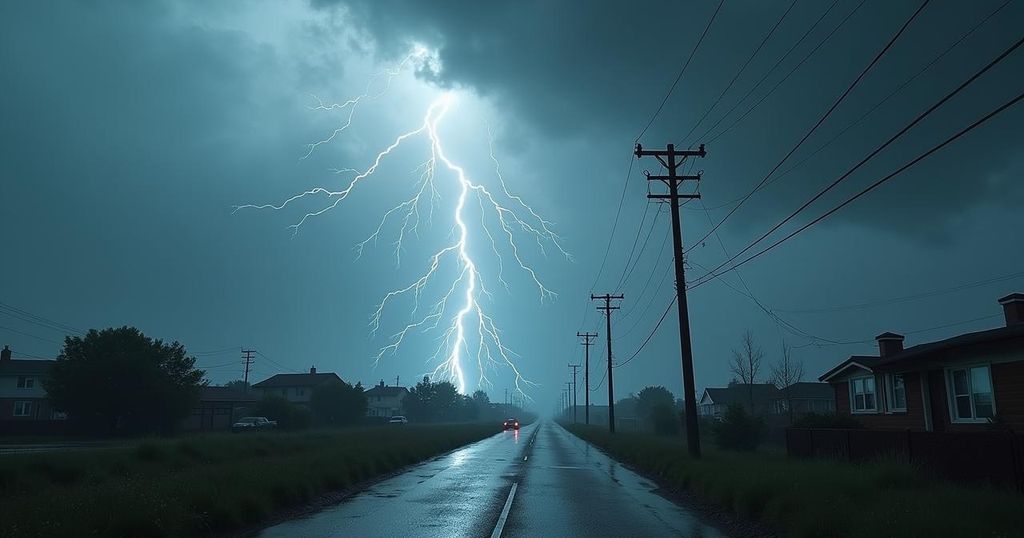Human-Caused Climate Change Intensifies Hurricanes: A Study of Helene and Milton
A new study finds that human-caused climate change enhanced Hurricane Helene’s rainfall by 10% and wind speeds by 11%, with implications for the approaching Hurricane Milton. The report highlights the increasing frequency and severity of storms due to climate change, warning of future risks unless fossil fuel use is curtailed.
Recent research has established that human-induced climate change significantly intensified Hurricane Helene, augmenting its rainfall by approximately 10% and enhancing wind speeds by around 11%. The study, released by World Weather Attribution, indicates that the warming climate contributed to Helene’s wind velocity increasing by roughly 13 miles per hour, correlating with sea surface temperatures in the Gulf of Mexico being elevated by about 3.6 degrees Fahrenheit. This factor made the high ocean temperatures that fueled the storm between 200 to 500 times more probable. According to Ben Clarke, a climate researcher at Imperial College London and co-author of the study, “Hurricane Helene and the storms that were happening in the region anyway have all been amplified by the fact that the air is warmer and can hold more moisture.” He elaborated that the rainfall totals were extraordinarily high due to these climate alterations, even beyond what was already anticipated based on previous storm patterns. As Hurricane Milton approaches the Florida coast, scientists warn that it could similarly be impacted by climate change dynamics. The ongoing use of fossil fuels poses a risk of future hurricanes resembling Helene, leading to severe natural disasters far from coastal regions, as evidenced by Helene’s inland flooding which claimed the lives of many. Hurricane Helene, which made landfall in Florida, was marked by a record storm surge of 15 feet and sustained winds reaching 140 miles per hour. The devastation spanned multiple states, including Georgia, Tennessee, and the Carolinas, resulting in the deaths of over 230 individuals and extensive property damage. Meteorologists estimate the storm unleashed more than 40 trillion gallons of rain in the region. The study suggests such intense storms were traditionally anticipated every 130 years but have become approximately 2.5 times more frequent due to climatic factors. The analysis conducted by the World Weather Attribution employs robust statistical methods to derive its conclusions, comparing the actual events against a hypothetical scenario in which global temperatures had not risen since pre-industrial times. An additional study from the Department of Energy reported that climate change contributed to increased rainfall intensity in various affected areas, illustrating the profound impact of rising global temperatures on severe weather patterns. Experts, including Kim Cobb, director of the Institute at Brown for Environment and Society, acknowledge the uncertainties regarding the extent of climate change’s influence on storms. Nonetheless, she promotes the urgency of enhancing emergency preparedness and resilience as a response to the escalating threats posed by hurricanes in a warming world. She cautioned, “Going forward, additional warming that we know will occur over the next 10 or 20 years will even worsen the statistics of hurricanes.” Clarke emphasized the importance of transitional energy choices in mitigating future hurricane risks: “…we still have control over what trajectory this goes in as to what risks we face in the future, what costs we pay in the future,” he noted. The latest studies indicate that climate change poses significant threats to infrastructural stability and public safety.
The occurrence and intensity of hurricanes have been increasingly linked to climate change, with scientific studies suggesting that anthropogenic factors are exacerbating weather patterns. The World Weather Attribution initiative examines acute weather phenomena to ascertain the contributions of climate change. Recent hurricanes have illustrated the severe implications of increased ocean temperatures and atmospheric moisture, impacting rainfall volumes and wind speeds significantly. As climate change progresses, the landscape of hurricane frequency and destructiveness may shift dramatically, posing escalating risks to populated areas.
In conclusion, climate change has demonstrably intensified weather events such as Hurricane Helene, indicative of a concerning trend that anticipates similar outcomes for future storms like Milton. The scientific consensus underscores the critical correlation between global warming and increased hurricane severity, urging immediate action on fossil fuel consumption to mitigate impending threats. Urgent preparedness and adaptive measures are essential to address the challenges posed by a rapidly changing climate.
Original Source: www.kxnet.com




Post Comment